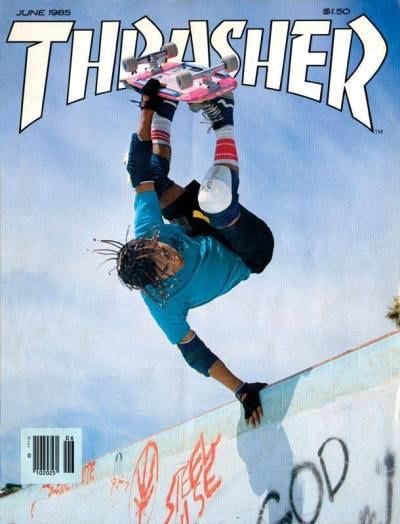Learning About Failing
This was originally written in 2014 and posted on my personal blog
Some guys buy new cars. Some guys try dating younger women. If I am dealing with a mid-life crisis, I am doing so by learning to skateboard again. Inspired by Bones Brigade: An Autobiography and my inevitable arrival in my 40's, I decided to learn to skate again. At first, I just wanted to be on a board again, I wanted to ride but that turned out to not be enough. I wanted to relearn some tricks, I wanted to do a little more than just roll down the street. So last week, I rolled down the street outside of my house in a quest to relearn the ollie.
The first thing I relearned was not the ollie, but insecurity. I had ventured outside on a weekday, shortly after school had ended for the day. First I noticed a group of kids turning on to my street, then, almost immediately, I noticed how uncomfortable I was to be seen by them. My mind quickly filled with thoughts of embarrassment and negativity so I decided to skate down to a nearby park. I am a grown man, confident in most respects, and I was hurrying away from a bunch of middle school kids because I didn't want them to see me. See me doing what, exactly? See me doing something that didn't belong to me anymore, something that had been taken over by younger generations. I was trespassing on uncertain ground. This territory may or may not belong to those kids, but it sure didn't belong to me anymore. I didn't want to be caught trespassing by the people that I perceived as holding the land now.
But as I skated off to the park, safely avoiding being seen by those innocents, I realized that my fear was not just of being seen doing something that an adult shouldn't be doing. I was scared that they would see me being bad at it. As I arrived at the park, I found that there were a few cars and I realized that it was almost inevitable that there would be witnesses to my fumblings. I wanted to avoid being seen because I believed that I would be seen failing. There is a vulnerability inherent in failure, and that feeling was far more frightening to me than being caught crying or locking my keys in my car. The feeling was closer to what I imagine it would feel like if I had to admit that I was illiterate. I am an adult and I should already be good at the stuff I do, right? In general, adults try new things like different restaurants or drinks. We don't tend to try to do new things, things that involve learning and *gasp* failing. (I think yoga is an exception here. I wonder why the vulnerability is not as present here.) If we do something that we aren't good at at this point in our lives, we do so ironically, like playing in a kickball league where we can all suck together before we go drink and laugh about how bad we all are. This is not ironic for me, this is an effort to reclaim a neglected territory, overgrown with the weeds of age. I must relearn something before I can relearn any tricks. I must relearn how to overcome my fear of failure and the vulnerability that accompanies it.
The awareness of my fear and vulnerability is teaching me another valuable lesson as a coach. I ask my players to try to new things. I put them in positions to fail every day. I understand that failure is part of learning but do they? Even if they do understand that (as I do), does that alleviate the fear and vulnerability that they must feel? My skateboarding experience tells me that there is no rationalization that can make those feelings go away. I am able to learn and, therefore, fail in relative anonymity but the athletes in my care are not afforded that same anonymity. They are going to fail in front of me and their peers and they are going to fail because my practice plans are designed to be challenging. I am glad that I have recently learned what that fear of failure feels like again so that I can better account for it and better assist my players as they struggle with it. As coaches, we talk about the fear of failure as a cliché but we tend to be far removed from that fear as a real thing that confronts us daily.
I haven't figured out how to make the fear and vulnerability go away but I have a newfound respect for my players as they battle with those feelings. That respect drives me to help them, to give them the freedom to be vulnerable in public and in front of people who they badly want to impress. I don't yet know how to best create that atmosphere for my teams but I believe that it begins with my example. I further believe that I must acknowledge fear and vulnerability every day, not directly but in my planning, in my evaluation, and in my feedback.
I work with athletes but I coach human beings. Living, breathing, thinking, feeling human beings. If I want them to succeed, to move closer to their potential, then I must manage the factors that interfere with that success. Not a bad lesson to learn from a skateboard.


